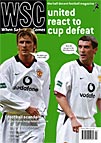 The Darlington chairman is banning those who criticise him from the club's new stadium. Ron Hamilton reports
The Darlington chairman is banning those who criticise him from the club's new stadium. Ron Hamilton reports
On the outskirts of Darlington stands the club’s fine new stadium. The 25,000-capacity, as-yet unnamed stadium boasts restaurants, a nightclub and a reputed £85,000 worth of marble flooring. A new home fit for a king rather than a team struggling to avoid the drop to the conference. And while this stadium will welcome the Conference-dodging Quakers on to the pitch for the first time at the start of next season, one man who will not be there is former editor of fanzine Where’s The Money Gone?, Dave MacLean. For that matter, neither is MacLean welcome at Darlington’s current, less glamorous abode, Feethams.
Over the course of the last month a bitter row has broken out at the club, a row that has now transcended simple football matters and taken on an altogether more sinister air. The saga began at the start of February when, in his editorial for WTMG, MacLean questioned the direction that the club was taking, and the continuing decline of both attendances and league position. The magazine also aimed a couple of derisory remarks in the direction of the chairman’s wife Susan, who dragged the club’s name through the mud a year ago when she accused the players of throwing games “by way of favours”.
Criticism, it would seem, does not wash with George Reynolds. Having confiscated MacLean’s season ticket and banned him from the ground, Reynolds launched an attack on his 16-year-old nemesis. “Hitler would have been proud of him,” read the chairman’s official statement. “He would have been part of his propaganda machine just like William Joyce, known as Lord Haw Haw.” It’s hard to resist the mental image of Reynolds’ notion that the Third Reich’s propaganda machine was built on stapled A4 sheets bitching about a disappointing second half away at Shrewsbury Town.
Reynolds didn’t however stop with ill-conceived character analogies. The next, and by far most worrying, step came nearly a fortnight after the initial furore. Responding to other fans who had, unsurprisingly, sided with fanzine rather than club, another statement appeared on the club’s website. On this occasion it was laden with threats, both to MacLean and anyone else out there who voiced an opinion: “The chairman is adamant that any such libel or slander against the Club will be struck down with the full force of the law… It is rumoured that legal action will be taken against David MacLean and his family. Should this action occur the courts could place a charge on their house to be set against any legal costs.”
Given the manner in which Reynolds referred to MacLean (not to mention the billboard outside the new stadium that recently carried Reynolds’ poster questioning the sexuality of a local DJ who had voiced similar dissent), could his own remarks be thought more likely to attract litigious reprisals than someone who questioned the performance of his local team?
Since Reynolds bought the club in 1999 his reign has been characterised by a number of high-profile incidents in which Darlington have managed to sneak their way into the national footballing consciousness. The Susan Reynolds debacle; the Faustino Asprilla shambles; the chairman’s “colourful” past as a convicted safe cracker: all secured the club its five minutes of ridicule. At no point, however, have circumstances reached anything near their current nadir. Past follies may have been largely humorous, but likening a teenage fanzine editor to a Nazi and making direct threats against him, his family and any other supporters of the club who dare to speak ill of the club’s plight is downright dangerous.
Reynolds likes to view himself as a man of the people, a rags-to-riches figure, the bad lad turned good. Despite his delusions, in this instance he has shown himself to be a crude individual who has resorted to bullying and censorship as soon as he is questioned. He boasted recently that he was “trying to give football back to the working classes”. Instead, by trying to silence or ostracise those who care most passionately about Darlington, George Reynolds is doing exactly the opposite.
From WSC 194 April 2003. What was happening this month